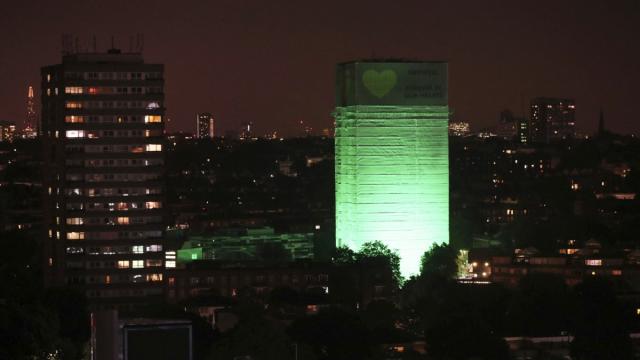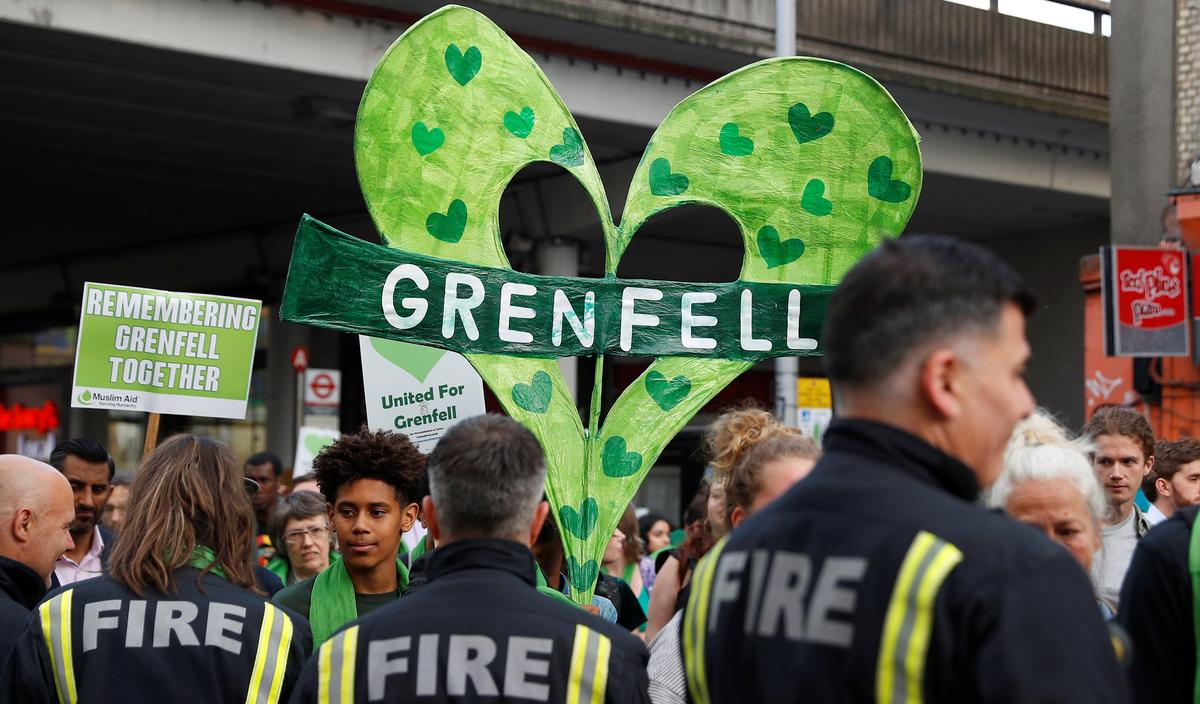
Two years ago, 72 people died in the Grenfell Tower fire, caused and catalyzed by disastrous political decisions that put profits over people, elevating property value over the sanctity of life.
The community surrounding Grenfell, in London, still awaits justice along with answers from the authorities. The charred Grenfell tower today still stands as a crime scene, while those responsible remain at large.
Grenfell tower is not only a graveyard but a symbol of contempt for the many communities attacked under austerity policies in Britain. In community-led resistance, the Grenfell site has also become a focal point of respect and resistance: On the 14th of every month, the anniversary of the fire, a silent walk calls for answers and remembers the victims.
This Saturday, June 15, starting at noon at Portland Place in London, there will be a solidarity march organized by Justice 4 Grenfell and Grenfell Trust.
What happens next for Grenfell is both simple and complex. Justice must be served, swiftly and thoroughly. The community cannot wait like the families of those killed in the 1989 Hillsborough disaster, where 96 football fans were crushed to death following police incompetence, or after Orgreave, where victims still await answers after police brutally attacked striking miners in 1984.
The local community needs to be central in deciding how the site is commemorated, including what happens to the remains of the building. Britain must learn lessons, not least how austerity and tearing up regulations can be literally fatal.
Problems abound
London and Britain must also draw wider lessons. Anyone spending time in Notting Dale cannot avoid noticing that people are living under the highly polluting A40 elevated dual carriageway, a main road connecting London to the west.
This road is another symbol of environmental racism, where working class communities, mostly of colour, live next to life-threatening pollution from other people's cars. Since the start of the industrial revolution, the poorer communities living in Notting Dale have faced environmental degradation. Before the road, they lived in the shadow of coal railway line, and before that they faced cholera from overcrowding and poor sanitation.
Globally, elevated urban motorways symbolize contempt for those living in their shadow.
Clearing the air at Grenfell
A solution to intense urban road pollution is both simple and complex: remove roads. In the 1960s, Notting Dale residents were at the fore protesting strongly against the A40 road. It was a central struggle, among many, for the local vibrant Caribbean-British community against British racism.
They lost the A40 battle, but won the war. A major plan to build elevated urban roads in Britain was scrapped. The community was also given land below the road. Today this land continues under the smog, and includes children's nurseries, community centers, sports areas and a skate park.
Removing the road could both pay homage to this #BlackLivesMatter movement of the past, and start to clear the air for Notting Dale and other communities moving forward.
Zoom out and London, like all major cities, is suffering an air pollution crisis driven greatly by motor vehicles. In tandem the world faces a climate crisis, where petrol and diesel vehicles are prime culprits. Less roads is one answer.
Imagining a breathable city
In Barcelona, under the leadership of radical municipalists Barcelona En Comú, City Hall has taken on the car. Recently, I visited a "superblock" in the neighborhood of Poblenou. Here what was once busy roads has been transformed into playgrounds. Benches now replace parked cars. I went on a tour with other municipalists walking down a wide pavement that had once held six lanes of traffic.
Turning to Wales, the national parliament just declared a climate emergency – a move that amplified pressure and led to the decision not to extend the M4 motorway, a congested artery connecting South Wales to England.
Instead, the Welsh assembly can use the £1.4 billion to rebuild public transport and replenish the rail network to take freight from tarmac to rails. Globally, we need to scale up this kind of green thinking.
It is widely accepted that any form of road building encourages more traffic. So, decreasing roads would move us the opposite way, not least if we invest in alternatives. The first step towards creating cities not overrun by cars is imagining how they will function.
To return to the Grenfell area, the very road infrastructure could also be easily upcycled to provide an alternative.
Green New Deal for Grenfell
One obvious thing to do with elevated roads, such as the A40, is to convert them into garden bridges with cycleways and public transport. This would immediately clear the smog problem and breathe new life into the community spaces and sports pitches already below the road. It would also enhance the lives of people living in the shadow of this road.
Additional space under the road could be used by cooperatives, exercising a democratic economic model to produce things for ecological and communities benefits. This model was examined in Occupy.com's Rebel Cities series, including in Jackson, Mississippi.
To solve the problem of transporting people and goods that would otherwise have used the road but can't use the cycleway, solar and wind cooperatives can generate the power needed to transit from road to rails and buses. Bike workshops could repair the extra two-wheeled traffic. In a city beyond the car, there would also be more space for cycle-powered rickshaws, electric scooters and other non-fossil fuel powered transport.
This blue-sky thinking applies far beyond Notting Dale and connects into the Green New Deal, a proposal which also needs to take on the car. The state could support transforming high-carbon infrastructure into a green powered revolution that makes our cities and atmosphere habitable. It moves Green New Deal thinking towards solving the riddle of creating de-growth, essential on a finite planet.
Upcycling roads to cycle lanes, with cooperative industries replacing heavy petrochemical consumption, is what we could call “spatial de-growth”. From an economic perspective, a cycleway and green transport system with cooperatives, all added together, account for less monetary value than a road where high-priced fuel is constantly being burned. In contrast, the infrastructure's ecological and societal value soars.
Grenfell deserves justice, far beyond clearing the air. But a focus on the area enables us to ask bigger questions about ending environmental racism, and makes it possible to imagine communities and cities not consumed by the motorcar. Bridging environmental justice with a Green New Deal vision provides a route to help us understand what went wrong and where. Changing paths, we can move towards a better future.

















